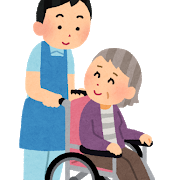介護福祉士、社会福祉士などの国家資格を有し、ボランティアとして何名もの合格者を生み出してきた経験もある私が、今後行われていく介護技能評価試験についての模擬問題を作成しました。
各国の受験者の皆様、どうぞご参考になさってください。
(英訳について間違いがあると思いますがご了承の上ご使用ください)
Having a national qualification such as a care worker and a social worker, and having experience of creating several successful candidates as a volunteer, I created a simulated problem about the nursing skill evaluation test to be conducted in the future.
For all candidates in each country, please refer to it.
(I think that there is a mistake in English translation, but please use on your note)

社会福祉法人で長年務めながらボランティアとして介護福祉士国家資格受験生と社会福祉士国家資格受験生をアドバイスしてきた実績がある。退職後、行政書士として開業する傍ら、一般社団法人日本海外人材支援機構で介護担当理事として外国と日本の橋渡しを行っている。
While serving as a social welfare corporation for many years, it has a track record of advising a care worker national qualification student and a social worker national qualification student as volunteers. After retiring, he started as an administrative scrivener, and he bridging Japan with foreign countries as a director in charge of care at the Japan Overseas Human Resources Agency.

※問題と選択肢の後に解答が表示されていますので、ゆっくりスクロールしてご覧ください。
The answers are displayed after the questions and options, so please scroll slowly.
問題1 こころとからだのしくみ
長期臥床(寝たきり)の高齢者に起き得る問題として、適切なものを1つ選びなさい。
Choose one that is appropriate for a long-term bedridden elderly person.
1 筋力が低下する Muscle strength decline
2 食欲が増す Have an increased appetite
3 会話の機会が増える More opportunities for conversation
4 歩行機会が多くなる Have more chances to walk
正答
1 筋力が低下する Muscle strength decline
長く寝ていると筋力が低下することの他、褥瘡が発生することにも注意が必要です。
In addition to the decrease in muscle strength when you go to bed for a long time, it is also important to be aware that bedsore occur.
問題2 コミュニケーション技術
高齢者との信頼関係を築くための対応として、適切なものを1つ選びなさい。
Choose an appropriate response to build a relationship of trust with the elderly.
1 感情的なこだわりを持つ Have a hard emotional feelings
2 最初の印象で判断する Judge by the first impression
3 受容と共感を意識する Be aware of acceptance and empathy
4 疑って接する Have a suspect and respond
正答
3 受容と共感を意識する Be aware of acceptance and empathy
高齢者と接する時は、「受容」、「共感」、「個別化」、「自己決定の尊重」、「非難しない」などを心がけることが必要です。
When dealing with elderly people, it is necessary to keep in mind “acceptance”, “empathy”, “individualization”, “respect for self-determination”, “do not blame”, etc.

問題3 コミュニケーション技術
コミュニケーションの技法として、適切なものを1つ選びなさい。
Choose one of the appropriate communication techniques.
1 相手を否定してもよい Deny the other party
2 話を途中でさえぎることも必要である It is also necessary to interrupt the story
3 傾聴的な態度を心がける Be aware of listening attitude
4 話を聞く態度は関係ない The attitude to listen to the story does not matter
正答
3 傾聴的な態度を心がける Be aware of listening attitude
「傾聴すること」は必ず正答となります。覚えておきましょう。その他、必ず正答となる言葉、「受容すること」、「共感すること」、「自己決定を尊重すること」、「否定しないこと」など。
“Listening closely” is always correct. Let’s remember. In addition, always correct word are, “to accept,” “to empathize,” “to respect self-determination,” “to not deny”
問題4 介護の基本
自立支援のために必要なこととして、適切なものを1つ選びなさい。
Choose one that is appropriate to independence support.
1 専門家からの説明は行わない Do not give explanations from experts
2 全てのことを手助けする Help with everything
3 その人らしさは関係ない The self personality does not matter
4 その人が持っている力を活用する Use the power that the person has
正答
4 その人が持っている力を活用する Use the power that the person has
自立支援のためには「残存能力の活用」が大切です。また解答技法として、「~ない」は間違った選択肢となることが多いので覚えておきましょう。
“Utilization of residual ability” is important for independence support. Also, remember that “~not” is often the wrong choice as an answering technique.
問題5 介護の基本
高齢者への身体拘束について、適切なものを1つ選びなさい。
Choose an appropriate body restraint for the elderly.
1 家族への説明はしなくても良い It is not necessary to explain to the family
2 緊急でやむを得ない場合にだけ可能である It is possible only when it is urgent and unavoidable
3 一人の判断で行うことができる It can be done by one person’s judgment
4 薬による行動抑制は含まれない Does not include behavioral control by drugs
正答
2 緊急でやむを得ない場合にだけ可能である It is possible only when it is urgent and unavoidable
身体拘束は原則禁止されています。①切迫している、②他に手段がない、③一時的にだけ行う、という条件が必要です。
Physical restraints are prohibited in principle. The conditions are 1) impending, 2) no other means, 3) temporary.

問題6 介護の基本
介護職員による虐待についての説明について、適切なものを1つ選びなさい。
Choose one of the appropriate explanations for abuse of by the care staff.
1 身体的虐待、心理的虐待、ネグレクトが多い There is a lot of physical abuse, psychological abuse and neglect
2 虐待される高齢者は女性より男性が多い Older people who are abused have more men than women
3 職員の関係性は問題にならない The relationship between staff does not matter
4 誰かが見ていれば絶対に虐待が起こることはない If someone is looking at it, no abuse of will happen definitely
正答
1 身体的虐待、心理的虐待、ネグレクトが多い There is a lot of physical abuse, psychological abuse and neglect
高齢者施設での職員からの虐待事件は日本でも大きく報道されているため、どの施設でも気を付けています。また、「絶対に」という言葉が選択肢に含まれていたらその選択肢は必ず×になります。
Abuse cases from staff members at facilities for the elderly are widely reported in Japan, so we take care at any facility. Also, if the word “absolutely” is included in the choice, that choice will always be x.
問題7 介護の基本
高齢者の生活場所についての説明として、適切なものを1つ選びなさい。
Choose an appropriate one as an explanation of where the elderly are live.
1 自分らしい空間は必要でない I do not need my own space
2 住み慣れた場所で生活することは安心感につながる Living in a familiar place leads to a sense of security
3 生活する環境が悪くても病気が悪化することはない Illness does not get worse even if the living environment is bad
4 施設では大人数収容できる部屋を作るべきである The facility should create a room that can accommodate a large number of people
正答
2 住み慣れた場所で生活することは安心感につながる Living in a familiar place leads to a sense of security
今、日本では施設で長く暮らすことよりも、できる限り自分の住み慣れた地域で暮らすことが大事だと言われています。
Now, in Japan, it is said that it is more important to live in the area where you live as much as possible than living in a facility for a long time.
問題8 こころとからだのしくみ
高齢者のうつ病への対応について、適切なものを1つ選びなさい。
Choose one appropriate for the elderly’s response to depression.
1 たくさん励ますことが必要である It is necessary to encourage a lot
2 自殺する危険性はない There is no risk of committing suicide
3 身体機能の低下につながる可能性はない It do not lead to a decline in physical function
4 受容的な態度をとるよう心がける Try to take a receptive attitude
正答
4 受容的な態度をとるよう心がける Try to take a receptive attitude
うつ病の人に励ますことは禁止とされています。日本では、子供から大人、高齢者まで多くのうつ病患者がいます。
Encouraging people with depression is prohibited. In Japan, there are many depression patients from children to adults and the elderly.
問題9 生活支援技術
片麻痺のある高齢者への介護方法として、適切なものを1つ選びなさい。
Choose one appropriate way of caring for the elderly with hemiplegia.
1 衣服は健側から患側の順に着せるようにする Wear clothes in order from the healthy side to the affected side
2 部屋のカーテンは開いたままで行う Please go with the curtains in the room open
3 ベッドの上で寝たまま着替える人には前開きの服が適している The front opening wear is suitable for those who change clothes while lying on the bed
4 着替えは最初から最後まで介助者が行うようにする Change of clothes should be done by the assistant from the beginning to the end
正答
3 ベッドの上で寝たまま着替える人には前開きの服が適している The front opening wear is suitable for those who change clothes while lying on the bed
衣服の着替えは麻痺がある側から着て、麻痺が無い側から脱ぎます。着替える時にはプライバシーにも注意しましょう。
Wear clothes from the side with paralysis and take off from the side without paralysis. Be careful about privacy when changing clothes.
問題10 生活支援技術
片麻痺のある高齢者への車椅子の介助方法について、適切なものを1つ選びなさい。
Choose one appropriate method of wheelchair assistance for the elderly with hemiplegia.
1 車椅子のフットレストは下げたまま乗り移らせる Let’s transfer while the footrest of the wheelchair is lowered
2 タイヤに手が巻き込まれる可能性は少ない There is little possibility that the hand is involved in the tire
3 車椅子は高齢者の麻痺側に置く Place the wheelchair on the paralyzed side of the elderly
4 ブレーキのかけ忘れが無いように必ず確認する Be sure to check that there is no forgetting to apply the brake
正答
4 ブレーキのかけ忘れが無いように必ず確認する Be sure to check that there is no forgetting to apply the brake
車椅子での介助は事故が起こりやすいため注意しましょう。麻痺が無い側に置く、フットレストは必ず上げてから乗り移る、ブレーキをかけ忘れない、走行中はタイヤに手が巻き込まれないよう注意する、などを心がけます。
As care in a wheelchair is prone to an accident, be careful. Put on the side where there is no paralysis, make sure to raise the footrest before transferring, do not forget to apply the brakes, and be careful not to get your hands caught in the tires while driving

以上、10問の模擬問題を作りました。その他、以下に介護技能評価試験で注意する点をまとめておきます。
As above, I created 10 mock questions. Other points to be noted in the nursing care evaluation test are summarized below.
片麻痺を理解しておく Understand the paralysis
片麻痺の問題が出題される可能性は高いと思われます。
衣服は患側から着て健側から脱ぐ、車椅子は健側に置くということは必ず覚えておきましょう。
There is a high possibility that the hemiplegia problem will be presented.
Make sure to wear the clothes from the affected side and take them off from the healthy side, and put the wheelchair on the healthy side.
「~ない」や「絶対」は×になることが多い ”~Not” and “Absolute” are often x
選択肢に「~ない」という否定的な言葉が出た場合は間違った選択肢となることが多いです。問題が全くわからなかった場合は、語尾が「~ない」という言葉は間違った選択肢として取り扱いましょう。また、「絶対に」も必ず×になります。
If a negative word “~not” appears in the choices, it is often the wrong choices. If you don’t understand the problem at all, treat the word “~not” as an incorrect choices. Also, “Absolute”word is will always be x.
自立支援を理解する Understand independence support
自立支援については出題される可能性が高いので確実に理解しておきましょう。「自分でできることはやる」、「自分で決められることは決める」が大切です。
There is a high possibility that you will be asked about independence support, so be sure to understand. “Do what you can do” and “Decide what you can decide” are important.
みなさん、頑張って日本の介護技能評価試験と介護日本語評価試験に合格して日本に来てくださいね!
Good luck everyone, please pass the Nursing care skills evaluation test and Nursing care Japanese language evaluation test and come to Japan!

※特定技能試験の解法テクニックを身に付ける講座はこちら!
送出機関・登録支援機関・個人用介護特定技能・介護福祉士試験共通得点アップ講座キット!
※介護現場で働いた経験が無い送り出し機関や登録支援機関、監理団体でもハイレベルな介護人材を送り出せるキットはこちら!











